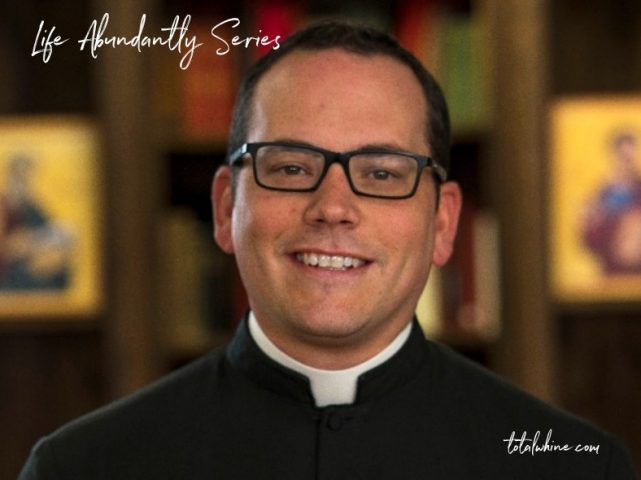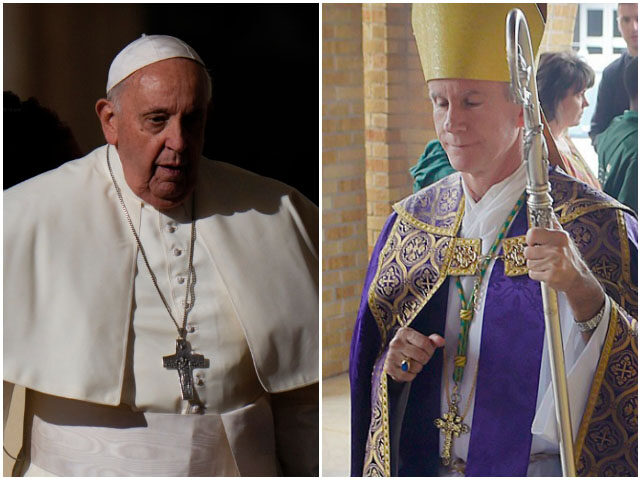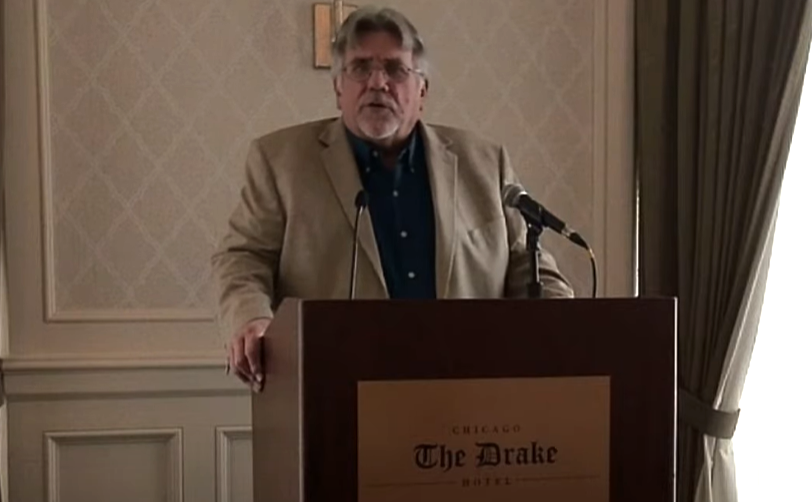By Fr. Justin Braun, July 27, 2019 Source: TotalWhine Blog
Posted by Emily H. Frase – Fr. Braun is a very dear friend of mine and even officiated my wedding almost 3 and a half years ago. He is an incredibly well-formed and holy priest, who is also very down-to-earth and a wonderful minister in every sense of the word. I remember frequently seeing him sitting in the church before mass having quiet time in prayer before the Blessed Sacrament. When a priest loves the Eucharist like that, and his flock deeply as a result, you can be assured he is solid. It is a true joy for me to share this interview with you, and I encourage you to share this with the priests you know. You can connect with Fr. Braun here: Diocese of Tyler Website | Homilies | Facebook
**********************
TW: Tell us a little about yourself, when you became a priest, about your diocese and your roles within it.
I grew up in a wonderful nuclear and extended family, spending my years of childhood in a neighborhood and parish that were vital to my formation and growth as a person and ultimately as a priest. My mom (cradle Catholic) and dad (who only a few years ago came into full communion with the Church) were very supportive, loving, and generous to my two sisters and I. Their support, example, and encouragement in the faith, even during the stresses of teenage life, were and continue to be a great source of strength.
My mom started taking me to adoration when I was about 14, and even though I didn’t get it at the time (which means I literally listened to Metallica on my headphones the first few times I went), this was the foundation of my priestly calling. Fast forward through the awkward early 20’s, where I was on the “discernment ferris wheel”, and ultimately you find me studying for priesthood at the Pontifical College Josephinum in Columbus, Ohio.
There I encountered a great professor, Dr. Perry Cahall, who helped me to dive deeper into the writings of St. John Paul II on marriage, family life, and ultimately his catechesis popularly titled Theology of the Body (TotB). With the intellectual rigor Dr. Cahall demanded, along with the pastoral formation I was experiencing working with lots of young families at my parish assignments, it became clear to me that working with people in the area of “responsible parenthood” and all that comes with that was going to be a significant part of priestly ministry for me.
I was ordained to the priesthood of Jesus Christ on June 9, 2012, before my entire family (we are legion!) and a crowded Cathedral of the Immaculate Conception for the Diocese of Tyler, TX. Since ordination, I have served in a variety of capacities, including being a parochial vicar at the Cathedral for 3 years, chaplain for the local Catholic schools, Director of Vocations, chaplain for campus ministry, and most recently, as parochial vicar at Sacred Heart parish in Texarkana, TX and as Director of Youth Formation for the St. Philip Institute of Catechesis and Evangelization.
TW: Some like to think that since priests are celibate, they can’t or shouldn’t talk knowledgeably with their flock about sex. How do you counter that, especially in light of Theology of the Body? How does TotB apply to priests and religious?
A classic question: how can you teach what you don’t know?
First some facts. Last time I checked this side of heaven, men are still men and deal with chastity no matter what their state in life may be. Second, I HEAR CONFESSIONS 🙂 While this does not mean every day I hear salacious details about what goes on in your bedrooms, I do generally hear quite a bit about marital and non-marital issues related to human sexuality. As mentioned above, we priests are trained to understand, counsel, and teach on these vital issues. On these topics, TotB, along with countless other magisterial and personal writings that make up the great body of thought in the Catholic Church have given a great theological framework for us to take principles from and apply to practical situations.
A final thought here: there is a great mystery in that the Catechism of the Catholic Church places the sacrament of marriage and holy orders together as “Sacraments of Service”. In this we find a rich complimentarity, not a division. In other words, the Church sees that these two sacraments are made to build up and serve one another ultimately in service to the Church and the world at large, and we should constantly seek to build those bridges of communication and support between married couples and the celibate priests and religious. We need to remember we are on the same team!
TW: What do you see as your role with regards to counseling married and engaged couples who struggle in the area of NFP and chastity (ie the sacrifices they incur, periods of abstinence, etc.)? What is your role on the same topics from the pulpit? In the confessional?
As a young priest, I have had the joy of preparing a lot of couples for marriage, and I am constantly asking myself: what do you say to this couple?
I seek the input of my priest mentors, lay couples that I am close to, and of course, Scripture and Tradition. But we must always acknowledge the moment of “encounter”, a theme Pope Francis has thrust into the mindset of the Church, and one I take seriously. The principle of the Incarnation is always at play here: Jesus entered into humanity’s history in a certain time and place, and he spoke the language of the people and cared for them in their circumstances. Am I not an alter Christus? Should I not apply with humility the teachings of Christ in the local situation as best I can?
This comes to my main point: WE HAVE TO ENGAGE FOLKS HERE!
As I work with my brother priests, sharing homily tips, listening to their advice, asking for input from trusted couples on how to approach certain topics from the pulpit, and most importantly reading and praying before the Blessed Sacrament, it becomes more and more obvious that the beauty of the Church’s teachings, and the sound psychological counsel of the saints come to bear on these topics.
I think of the parents of St. Catherine of Siena for instance, who had 25 kids. What did their parish priest say to them? Or the priest of St. Gianna Molla. How did he counsel her in her difficulties? These priests must have given them hope, must have listened to them, and ultimately called them to be generous with what God desires for them. This was only credible to these saints because their priests too were living lives of sacrifice and sanctity, which is where I think my brother priests and religious need to step-up and offer to the world a more vivid and credible witness, letting parents and couples know you are not alone in your sacrifices and challenges.
TW: In light of that, how can priests equip themselves to talk more openly and knowledgeably on these topics?
READ! We live in a “golden era” of information, and yes, some of it is useless, but really, we need to read and LISTEN. Don’t have any fear listening to the mother of two kids who are literally hanging on to her pants as her beautiful pregnant belly bulges in front of her. Maybe she is just there to say hi, or maybe she needs some adult conversation for a few minutes, or maybe she’s “fed up” with being open to life. Whatever is going on, BE THERE BROTHERS!
I had the chance, as I said before, to participate in a pretty robust program on marriage and family life through my academic studies, as well as getting excellent exposure to various NFP methods and the challenges that come with that lifestyle. Take advantage of workshops and seminars offered by the TOB Institute, the local Family Life Office if you have one (our Family Life Director, Deanna Johnston, who you heard from Thursday is a boss!). Finally, don’t be afraid to admit you are ignorant of something and need to do more research. The people of God will appreciate your humility and the fact that you cared enough to do something about it!
TW: What do you say to those who are caught up in sexual sins, whether single or married?
I ask them about happiness: what does it mean for them? How have their current actions helped them to be happy?
The beauty of chastity, self-denial, integrated and selfless love, is that it actually makes you happier! The virtues are not some archaic set of propositions to make you miserable, but rather reveal man more fully to himself. Sexual sins often are just the symptom of a life caught up in the world, a life devoid of or only shallowly engaging the joyful life of faith, and that is the bigger problem. To re-engage someone where they are at is the chance of “encounter”, but to lead them away from sin, as Jesus did with the woman caught in adultery, is one of the most meaningful and life-giving works of every Christian.
As priests, we stand in that most awe-inspiring gap between man and God, working as servants of truth and life, and we can only help our brothers and sisters out if we are really willing to do the hard work of forming them in the school of virtue, which is a blessed life!
TW: Where do you think the Church does well in teaching NFP? Where can she grow and do better?
The Church does well in teaching NFP where she is actively engaging multiple people in the various methods and just putting it out there – like as much as possible! The saddest thing for me as a priest to hear is the countless young men and women who say to me: “Father, I have never heard of this stuff before” This is where we need to do better, in preaching, in engaging people in a way that doesn’t just sound like a big “NO” but rather to saying “YES” to the good, true, and beautiful in married life and love.
Also, honesty is paramount. I read Simcha Fisher’s book, A Sinner’s Guide to Natural Family Planning, a few years ago on the challenges of NFP in a practical way. The truth of her writing, how she elaborates the experience of my sisters and their challenges with pregnancies, along with the hundreds of couples I have worked with over these first seven years of priesthood have all helped me to better understand that we all need to be more honest with each other about NFP.
TW: What are your favorite resources for couples interested in learning more about authentic love, NFP, and holy sex?
I think every priest will have a different answer to a degree on this.
Holy Scripture is the first source, because the whole thing is a love story, and begins and ends with marriage. This is untapped for many of us who just prepare homilies day in and day out, but truly, getting grounded in scripture has been a HUGE help.
As for books, I really like the weight of St. John Paul II’s Love and Responsibility. It’s not an easy read, but is a great resource for better understanding the dynamics at work in married love. Edward Sri has a great introduction to this by the way, called Men, Women, and the Mystery of Love, I would highly recommend.
Knowing the theological and pastoral resources of the Church is also vital, and that means doing some research. Donum Vitae, Humane Vitae, Familaris Consortio, and TotB are all very informative. Nowadays too, with digital technology, I often just read mom blogs, man blogs, and pay attention to what my bishop says on these issues (Bishop Strickland is a great proponent of the family, as his Teaching Constitution has evidenced).
TW: Any final thoughts to share from your experience?
Be patient with each other: your spouse, your priest, and yourself! NFP and the Church’s moral vision for the family, founded on the teachings of Christ and His Apostles, is an invitation to live a full life – one with suffering and sacrifices, yes, but ultimately with so much more joy and hope that the difficulties pale in comparison. Whenever you are struggling with cervical mucus, charting, raging hormones, or a spouse who seems to live on a different planet, remember to turn to the Lord in the Eucharist and Our Lady and St. Joseph. They will always be near, and by their example and intercession will help you to live as a holy family!
**********************
Missed the other stories in the Life Abundantly Series? Click here.
For additional NFP resources, click here.







